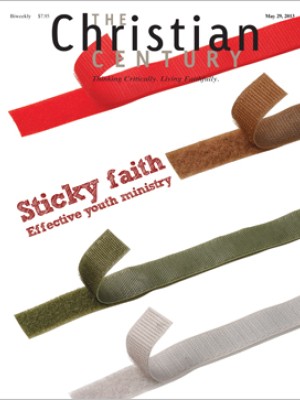Gifted
It’s easy to oversimplify the reality of developmental and cognitive disabilities when we’re trying to empathize with someone. With the best of intentions we say things like “God only gives a burden like this to those strong enough to bear it,” “She must by such a gift to you” and “She must teach you so much.” We pass over the challenges that confront the families of persons with developmental disabilities and the daily commitment of resources, energy and time that are required of them.
Yet there is still truth in those well-meant oversimplifications. I know. Rachel Diane, my 18-year-old granddaughter, has Down syndrome. Rachel is a gift to her parents, who have learned patience—patience with their daughter as well as patience with a culture that’s painfully slow to understand people with developmental disabilities and to provide them with opportunities for a full, productive life.
Read our latest issue or browse back issues.
Rachel is a gift to her younger brother and sister, too, and has taught them what it means to be a family and how their family can be a bulwark, a safe haven, in a sometimes frightening world. When she was six and her little brother was four, some of his schoolmates were making fun of Rachel. He defiantly defended his sister with “She can spell ‘cow’ and you can’t!”
I see Rachel every week. Her greetings are so exuberant, so full of unrestrained happiness, that it lifts my heart. No one is as glad to see me as Rachel. She is a gift to me.
Rachel has introduced me to a community of wonderful people. Parents and families of children with Down syndrome find one another, offer mutual support, organize social activities and enjoy special friendships. My son, Rachel’s father, heard about a young father who was devastated when he learned that his daughter was born with Down syndrome. My son picked up the phone, invited the man to lunch, and assured him that life had not come to an end.
Rachel loves school. She attends a public school (Illinois provides for her to remain in school until she is 21) where she is mainstreamed and attends class with her abled classmates, then goes to special classes that teach valuable life skills. She plays basketball, sings in the church youth choir and helps with a day camp for kids with developmental disabilities sponsored by the City of Chicago Parks and Recreation Department.
She is also a member of Gigi’s Playhouse, a remarkable nonprofit organization that was founded in 2003 to increase awareness of Down syndrome through education and individual empowerment. My wife and I recently attended a production of Shakespeare’s Taming of the Shrew sponsored by Gigi’s teen drama group. Earlier this year we saw Romeo and Juliet, A Midsummer Night’s Dream and The Wizard of Oz.
I am moved by the magic of these performances and deeply touched every time I see the love and commitment of the volunteers from Chicago’s theater community who work with the sets, costuming and lighting and “shadow” each actor. Rachel and 16 of her friends portrayed Baptista, Lucentio, Petruchio, Bianca and Katherine. Each stood in front of a volunteer who helped by reading Shakespeare’s lines as needed. The youngsters repeated the lines and vigorously acted the roles with emotion, Shakespearean wit and passion.
In a week otherwise filled with obsessive television coverage of murder trials, the Boston bombing and hunger strikes by prisoners at Guantanamo, this performance, with Rachel pouring her heart into the roles of Bianca, Petruchio and Katherine, was a note of hope.






